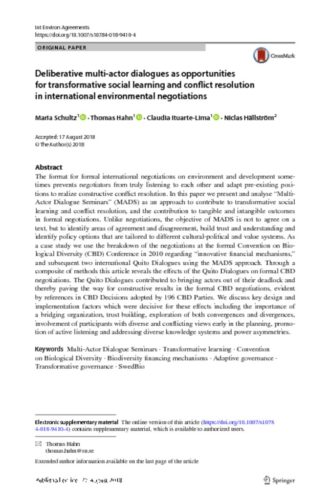Deliberative multi‐actor dialogues as opportunities for transformative social learning and conflict resolution in international environmental negotiations
This article was published in the scientific journal "International Environmental Agreements: Politics, Law and Economics" and analyses experiences and potential for multi-actor dialogues to drive transformational change. It presents two cases from the international multi-actor dialogues organised by the authors on biodiversity financing that are held in Quito 2012 and 2014, and also draws on prior WhatNext? experiences.
Highlights
- Dialogues can bring more nuances to understanding the landscape of ideas, values, assump- tions, interests and power relationships and contribute to national and international envi- ronmental governance.
- The Quito Dialogues were characterized by an inclusive planning process, fostering a listening mode, putting ideologically contested issues on the table and handling power asymmetries to facilitate that the experiences and perspectives of diverse actors, including marginalized groups, are acknowledged.
- Results suggest that the Quito Dialogues contributed to transformative social learning, constructive conflict resolution and improved international negotiations in the context of the Convention on Biological Diversity.
- In international conflict resolution, there is a need to include understanding of the negotiators’ culture, their religion, their native language and the epistemologies (way of knowing) and cognitive heuristics (cognitive rules) they use.
- To help build a shared vision for how to achieve decision-making and implement international commit- ments, such as related to CBD, and likewise in the broader context the Sustainable Devel- opment Goals, we need better dialogue and learning across cultures, interests and various actor groups.
- Real dialogues require time and resources.
- Improved dialogue cultures may be one of the biggest opportunities we have to reach genuine solutions in the quest for a sustainable future.
More info/Summary


